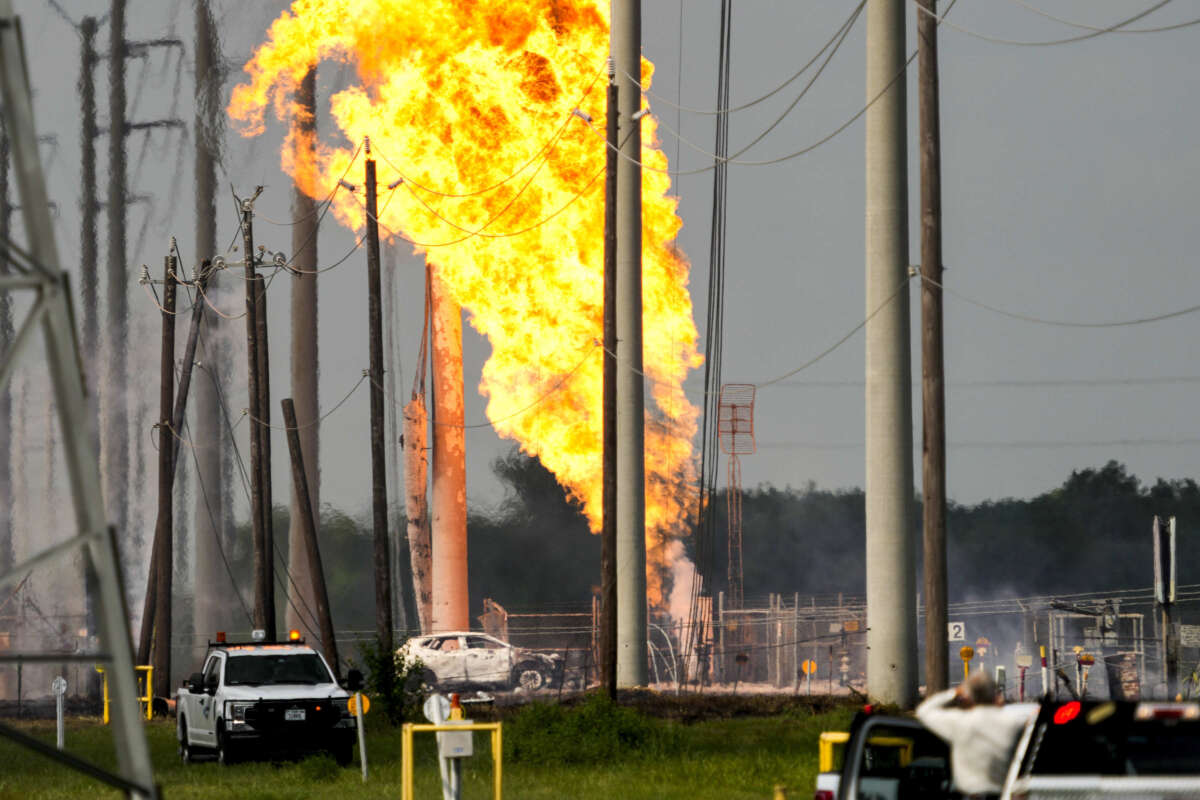A pipeline carrying fossil gas liquids exploded next to a residential area in the suburbs of Houston on Monday morning, sending a massive pillar of fire into the sky as first responders evacuated nearly 1,000 neighboring homes.
Energy Transfer, the company operating the 20-inch fossil gas pipeline near the border of the Houston suburbs of Deer Park and La Porte, has a long record of spills and accidents. Formerly known as Energy Transfer Partners, the company has faced international scrutiny and intense protests against major pipeline projects, including the Dakota Access Pipeline that inspired mass Indigenous-led resistance at Standing Rock in 2016.
Remaining gas liquids were still burning off more 12 hours after the initial explosion on Tuesday, spewing pollution directly into the atmosphere. Thousands of area residents temporarily lost power. Students at nearby schools and a college campus were ordered to shelter in place on Monday, and aerial camera footage shows firefighters racing to douse nearby homes with water as flames shoot into the sky.
Local officials reported few injuries and no deaths by Tuesday morning, but the explosion was a stark reminder of the dangers posed to local communities by rapidly expanding fossil fuel infrastructure in the Gulf South and beyond.
Located about 25 miles southwest of Houston, La Porte has the highest concentration of petrochemical plants in the world, with nearly 50 plants, two ports and miles of pipelines that transport hazardous materials, according to reports. Pipelines zigzag across the community, carrying oil and gas products used to make various plastics, chemicals and fossil fuels.
In a statement, Energy Transfer said it was aware of initial reports that an “unknown passenger car” had struck a pipeline valve station where the explosion occurred. Investigations into the blast are ongoing, but officials said it seemed to be an “isolated incident,” according to reports.
Energy Transfer shut down the pipeline and allowed remaining gas liquids to burn off, a process that continued on Tuesday. Firefighters spent hours attempting to keep nearby homes from catching fire as the pipeline burned.
Unfortunately, explosions and leakage of toxic pollution have become a fact of life in a region dominated by refineries, petrochemical plants, and fossil fuel export terminals. Texas produces more oil and gas than any other state, and Houston has long been considered the heart of the petrochemical industry. Neighboring Louisiana is also home to large plants and refineries, and residents deal with pollution and toxic explosions from fossil fuel infrastructure there as well.
Still, the industry is pushing for a massive expansion of liquified natural gas, or LNG, export infrastructure on the Gulf Coast and beyond in order to send more U.S. fracked gas overseas, raising fears about more fires and accidents in communities where residents are sick of living with petrochemical pollution. Climate scientists recently warned federal regulators that LNG is dirtier than coal over the course of its lifecycle.
While Energy Transfer is in the LNG export business, which involves condensing fossil gas at very low temperatures for transport, the company told news outlets that the “natural gas liquids” burning in the pipeline that exploded outside of Houston are primarily used in petrochemical manufacturing.
However, there remained confusion in Deer Park and La Porte about what particular gas chemicals were being burned off near surrounding communities. In a statement on Monday, Texas Environmental Justice Advocacy Services asked federal regulators to identify the chemicals accurately so residents can take necessary precautions. Statements from Energy Transfer and local companies did not specify what type of gas liquid burned, such as ethane, butane or propane.
“Today’s massive pipeline fire at Energy Transfer Partners in La Porte, TX, is another reason why we are highly concerned regarding natural gas pipelines and liquid natural gas, especially with these pipelines going through residential neighborhoods,” the group said.
Energy Transfer has a long history of facing environmental and climate protests as it aggressively pushed to expand pipelines and other infrastructure. Two of the company’s major oil projects, the Dakota Access Pipeline and the Bayou Bridge Pipeline in Louisiana, were challenged by Indigenous-led direct action campaigns that caught international attention between 2016 and 2019.
In 2017, Energy Transfer sued members of the Standing Rock Sioux Tribe and the international environmental group Greenpeace over the protests against the Dakota Access Pipeline, but the lawsuits were dismissed. The company filed a similar lawsuit against Greenpeace in a North Dakota state court over the protests for $300 million in 2019.
Scheduled to go to court next year, Greenpeace has decried the lawsuit as “laughably false and deeply racist” for claiming that the group organized the resistance to Dakota Access Pipeline, when in fact the protest camp was organized by Indigenous-led Water Protectors and the Standing Rock Sioux. Greenpeace also called the lawsuit abuse of the legal system and an attack on free speech.
“This lawsuit makes allegations that affect people far beyond Greenpeace,” the group said in an open letter to Energy Transfer. “It attempts to rewrite the history of the Indigenous-led opposition movement at Standing Rock — by absurdly alleging that Greenpeace orchestrated the entire resistance.”
At least 290 allied organizations have signed the open letter in solidarity with Greenpeace.
Trump is silencing political dissent. We appeal for your support.
Progressive nonprofits are the latest target caught in Trump’s crosshairs. With the aim of eliminating political opposition, Trump and his sycophants are working to curb government funding, constrain private foundations, and even cut tax-exempt status from organizations he dislikes.
We’re concerned, because Truthout is not immune to such bad-faith attacks.
We can only resist Trump’s attacks by cultivating a strong base of support. The right-wing mediasphere is funded comfortably by billionaire owners and venture capitalist philanthropists. At Truthout, we have you.
Truthout has launched a fundraiser, and we must raise $31,000 in the next 4 days. Please take a meaningful action in the fight against authoritarianism: make a one-time or monthly donation to Truthout. If you have the means, please dig deep.
